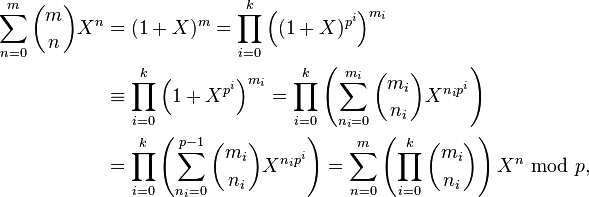Lucas' theorem
In number theory, Lucas's theorem expresses the remainder of division of the binomial coefficient  by a prime number p in terms of the base p expansions of the integers m and n.
by a prime number p in terms of the base p expansions of the integers m and n.
Lucas's theorem first appeared in 1878 in papers by Édouard Lucas.[1]
Formulation
For non-negative integers m and n and a prime p, the following congruence relation holds:
where
and
are the base p expansions of m and n respectively. This uses the convention that  = 0 if m < n.
= 0 if m < n.
Consequence
- A binomial coefficient
 is divisible by a prime p if and only if at least one of the base p digits of n is greater than the corresponding digit of m.
is divisible by a prime p if and only if at least one of the base p digits of n is greater than the corresponding digit of m.
Proof
There are several ways to prove Lucas's theorem. We first give a combinatorial argument and then a proof based on generating functions.
Let M be a set with m elements, and divide it into mi cycles of length pi for the various values of i. Then each of these cycles can be rotated separately, so that a group G which is the Cartesian product of cyclic groups Cpi acts on M. It thus also acts on subsets N of size n. Since the number of elements in G is a power of p, the same is true of any of its orbits. Thus in order to compute  modulo p, we only need to consider fixed points of this group action. The fixed points are those subsets N that are a union of some of the cycles. More precisely one can show by induction on k-i, that N must have exactly ni cycles of size pi. Thus the number of choices for N is exactly
modulo p, we only need to consider fixed points of this group action. The fixed points are those subsets N that are a union of some of the cycles. More precisely one can show by induction on k-i, that N must have exactly ni cycles of size pi. Thus the number of choices for N is exactly
 .
.
Here is a proof based on generating functions, due to Nathan Fine.[2]
If p is a prime and n is an integer with 1≤n≤p-1, then the numerator of the binomial coefficient
is divisible by p but the denominator is not. Hence p divides  . In terms of ordinary generating functions, this means that
. In terms of ordinary generating functions, this means that
Continuing by induction, we have for every nonnegative integer i that
Now let m be a nonnegative integer, and let p be a prime. Write m in base p, so that  for some nonnegative integer k and integers mi with 0 ≤ mi ≤ p-1. Then
for some nonnegative integer k and integers mi with 0 ≤ mi ≤ p-1. Then
where in the final product, ni is digit i in the base p representation of n. This proves Lucas's theorem.
Variations and generalizations
- The largest integer k such that pk divides the binomial coefficient
 (or in other words, the valuation of the binomial coefficient with respect to the prime p) is equal to the number of carries that occur when n and m − n are added in the base p. (This result is known as Kummer's theorem.)
(or in other words, the valuation of the binomial coefficient with respect to the prime p) is equal to the number of carries that occur when n and m − n are added in the base p. (This result is known as Kummer's theorem.) - Andrew Granville has given a generalization of Lucas's theorem to the case of p being a power of prime.[3]
References
- ↑
- Edouard Lucas (1878). "Théorie des Fonctions Numériques Simplement Périodiques". American Journal of Mathematics 1 (2): 184–196. doi:10.2307/2369308. JSTOR 2369308. MR 1505161. (part 1);
- Edouard Lucas (1878). "Théorie des Fonctions Numériques Simplement Périodiques". American Journal of Mathematics 1 (3): 197–240. doi:10.2307/2369311. JSTOR 2369311. MR 1505164. (part 2);
- Edouard Lucas (1878). "Théorie des Fonctions Numériques Simplement Périodiques". American Journal of Mathematics 1 (4): 289–321. doi:10.2307/2369373. JSTOR 2369373. MR 1505176. (part 3)
- ↑ Fine, Nathan (1947). "Binomial coefficients modulo a prime". American Mathematical Monthly 54: 589–592. doi:10.2307/2304500.
- ↑ Andrew Granville (1997). "Arithmetic Properties of Binomial Coefficients I: Binomial coefficients modulo prime powers". Canadian Mathematical Society Conference Proceedings 20: 253–275. MR 1483922.






